Comprehensive Analysis of Healthcare Systems: Turkey & Saudi Arabia
VerifiedAdded on 2020/03/16
|7
|2366
|164
Report
AI Summary
This report provides a comparative analysis of the healthcare systems in Turkey and Saudi Arabia. It begins by outlining the organizational structures of each system, detailing the roles of the Ministry of Health, other governmental bodies, and private organizations. The report then delves into the healthcare regulations in both countries, emphasizing the importance of these regulations in addressing emerging diseases and international health concerns. It examines the aims of funding for access to healthcare services and the delivery models in both nations, including how these systems are financed and the challenges faced. The report highlights the common elements and key differences between the two healthcare systems, providing a comprehensive overview of their strengths, weaknesses, and approaches to public health. The analysis includes discussions of military healthcare facilities, international health regulations, and the role of various healthcare providers. The report concludes by summarizing the key findings and providing a comparative perspective on the two systems' approaches to healthcare provision and management.
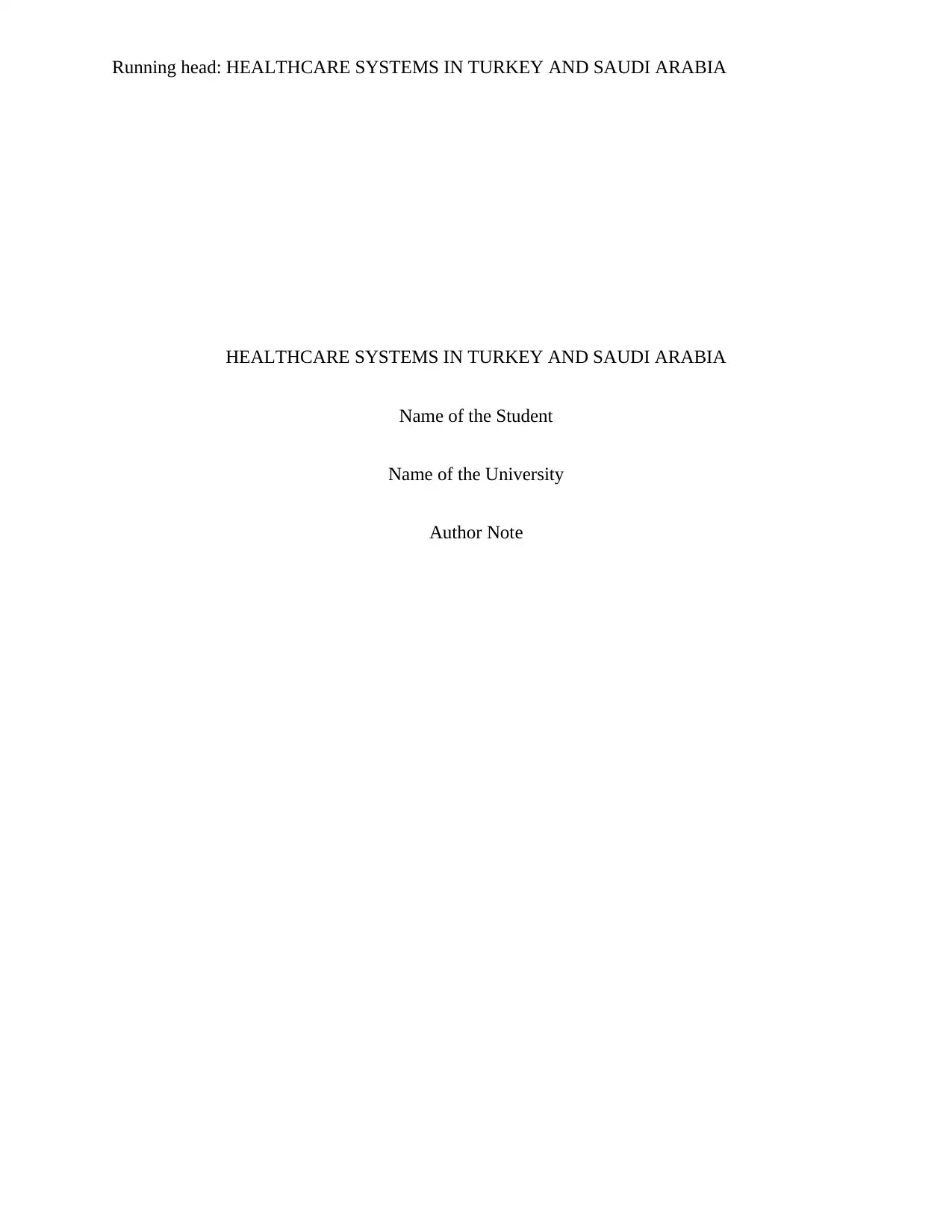
Running head: HEALTHCARE SYSTEMS IN TURKEY AND SAUDI ARABIA
HEALTHCARE SYSTEMS IN TURKEY AND SAUDI ARABIA
Name of the Student
Name of the University
Author Note
HEALTHCARE SYSTEMS IN TURKEY AND SAUDI ARABIA
Name of the Student
Name of the University
Author Note
Paraphrase This Document
Need a fresh take? Get an instant paraphrase of this document with our AI Paraphraser
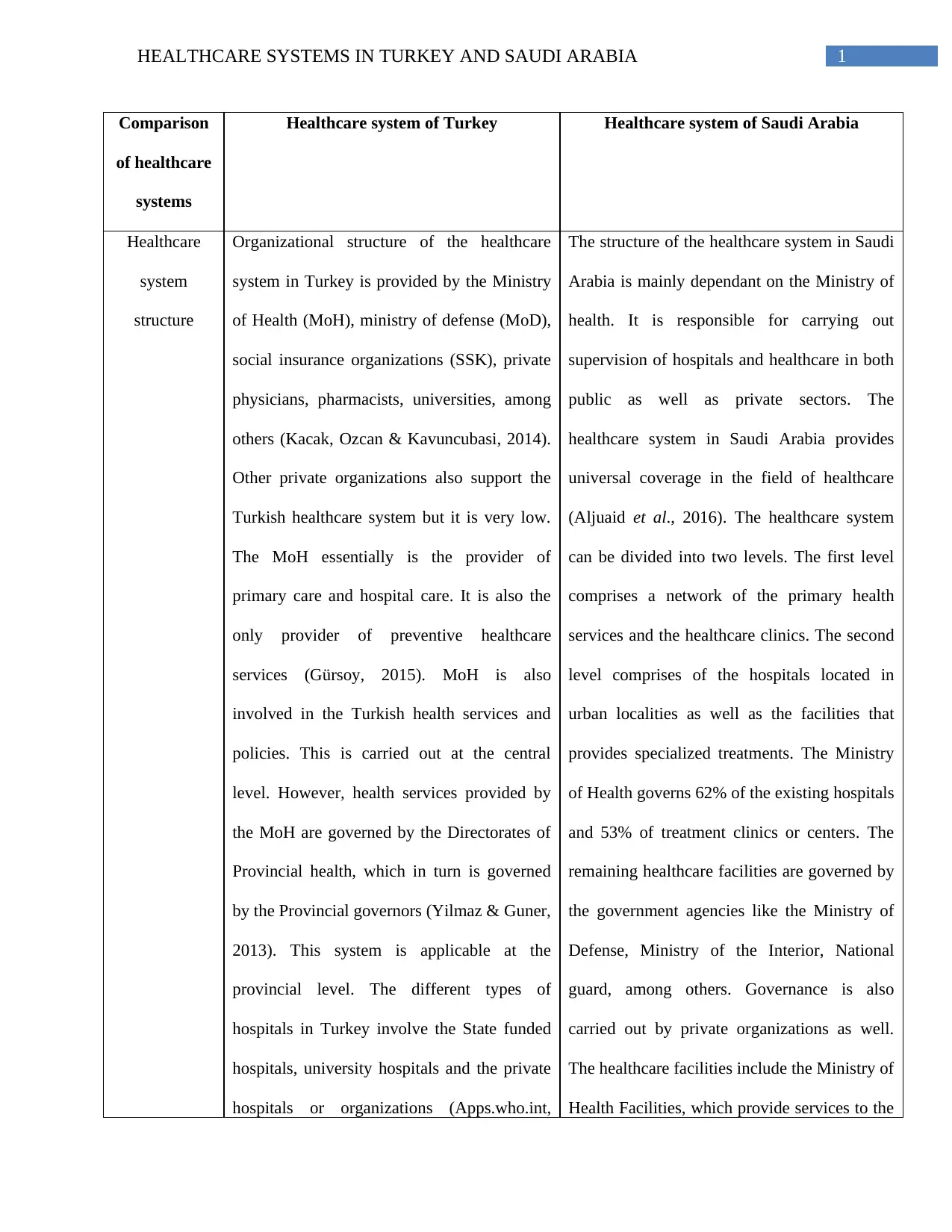
1HEALTHCARE SYSTEMS IN TURKEY AND SAUDI ARABIA
Comparison
of healthcare
systems
Healthcare system of Turkey Healthcare system of Saudi Arabia
Healthcare
system
structure
Organizational structure of the healthcare
system in Turkey is provided by the Ministry
of Health (MoH), ministry of defense (MoD),
social insurance organizations (SSK), private
physicians, pharmacists, universities, among
others (Kacak, Ozcan & Kavuncubasi, 2014).
Other private organizations also support the
Turkish healthcare system but it is very low.
The MoH essentially is the provider of
primary care and hospital care. It is also the
only provider of preventive healthcare
services (Gürsoy, 2015). MoH is also
involved in the Turkish health services and
policies. This is carried out at the central
level. However, health services provided by
the MoH are governed by the Directorates of
Provincial health, which in turn is governed
by the Provincial governors (Yilmaz & Guner,
2013). This system is applicable at the
provincial level. The different types of
hospitals in Turkey involve the State funded
hospitals, university hospitals and the private
hospitals or organizations (Apps.who.int,
The structure of the healthcare system in Saudi
Arabia is mainly dependant on the Ministry of
health. It is responsible for carrying out
supervision of hospitals and healthcare in both
public as well as private sectors. The
healthcare system in Saudi Arabia provides
universal coverage in the field of healthcare
(Aljuaid et al., 2016). The healthcare system
can be divided into two levels. The first level
comprises a network of the primary health
services and the healthcare clinics. The second
level comprises of the hospitals located in
urban localities as well as the facilities that
provides specialized treatments. The Ministry
of Health governs 62% of the existing hospitals
and 53% of treatment clinics or centers. The
remaining healthcare facilities are governed by
the government agencies like the Ministry of
Defense, Ministry of the Interior, National
guard, among others. Governance is also
carried out by private organizations as well.
The healthcare facilities include the Ministry of
Health Facilities, which provide services to the
Comparison
of healthcare
systems
Healthcare system of Turkey Healthcare system of Saudi Arabia
Healthcare
system
structure
Organizational structure of the healthcare
system in Turkey is provided by the Ministry
of Health (MoH), ministry of defense (MoD),
social insurance organizations (SSK), private
physicians, pharmacists, universities, among
others (Kacak, Ozcan & Kavuncubasi, 2014).
Other private organizations also support the
Turkish healthcare system but it is very low.
The MoH essentially is the provider of
primary care and hospital care. It is also the
only provider of preventive healthcare
services (Gürsoy, 2015). MoH is also
involved in the Turkish health services and
policies. This is carried out at the central
level. However, health services provided by
the MoH are governed by the Directorates of
Provincial health, which in turn is governed
by the Provincial governors (Yilmaz & Guner,
2013). This system is applicable at the
provincial level. The different types of
hospitals in Turkey involve the State funded
hospitals, university hospitals and the private
hospitals or organizations (Apps.who.int,
The structure of the healthcare system in Saudi
Arabia is mainly dependant on the Ministry of
health. It is responsible for carrying out
supervision of hospitals and healthcare in both
public as well as private sectors. The
healthcare system in Saudi Arabia provides
universal coverage in the field of healthcare
(Aljuaid et al., 2016). The healthcare system
can be divided into two levels. The first level
comprises a network of the primary health
services and the healthcare clinics. The second
level comprises of the hospitals located in
urban localities as well as the facilities that
provides specialized treatments. The Ministry
of Health governs 62% of the existing hospitals
and 53% of treatment clinics or centers. The
remaining healthcare facilities are governed by
the government agencies like the Ministry of
Defense, Ministry of the Interior, National
guard, among others. Governance is also
carried out by private organizations as well.
The healthcare facilities include the Ministry of
Health Facilities, which provide services to the
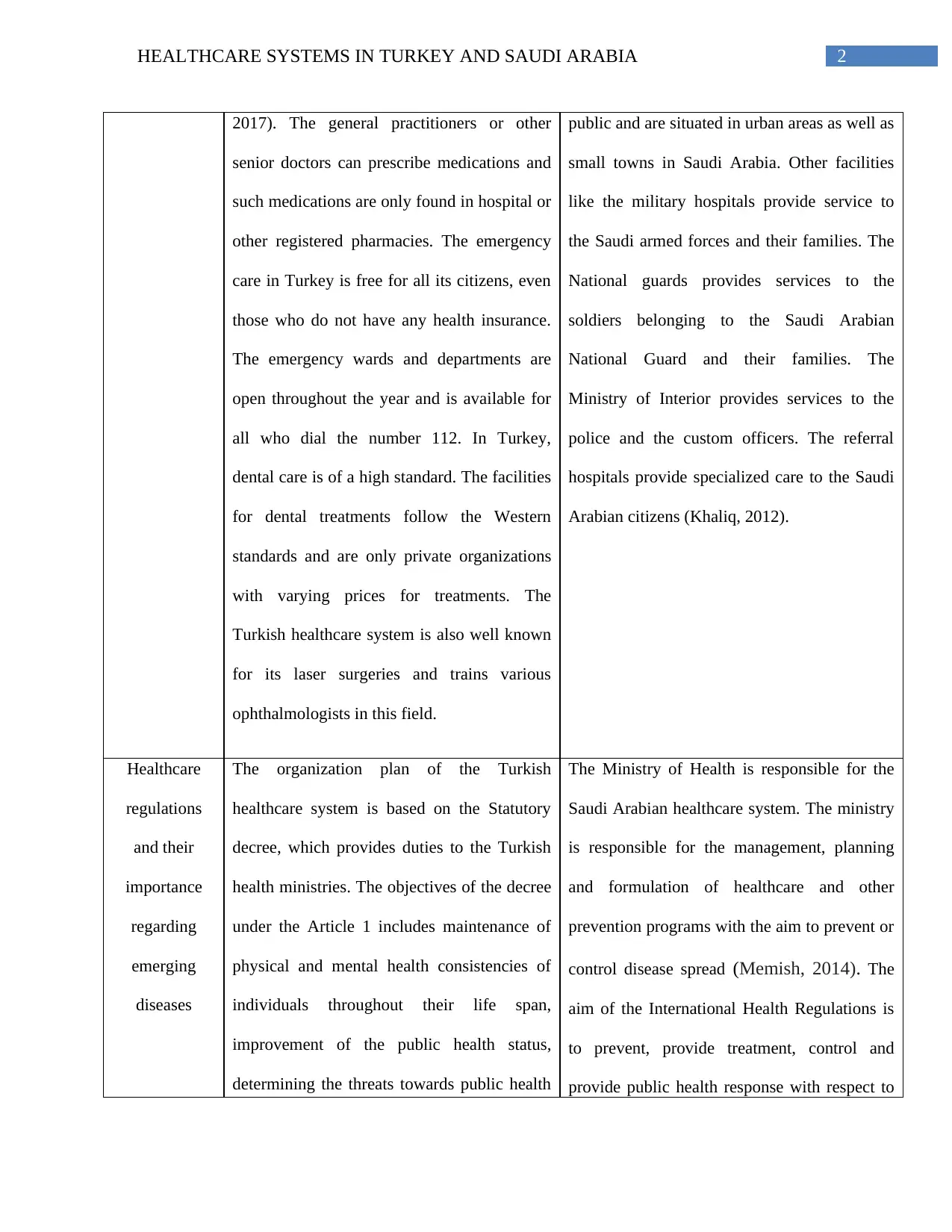
2HEALTHCARE SYSTEMS IN TURKEY AND SAUDI ARABIA
2017). The general practitioners or other
senior doctors can prescribe medications and
such medications are only found in hospital or
other registered pharmacies. The emergency
care in Turkey is free for all its citizens, even
those who do not have any health insurance.
The emergency wards and departments are
open throughout the year and is available for
all who dial the number 112. In Turkey,
dental care is of a high standard. The facilities
for dental treatments follow the Western
standards and are only private organizations
with varying prices for treatments. The
Turkish healthcare system is also well known
for its laser surgeries and trains various
ophthalmologists in this field.
public and are situated in urban areas as well as
small towns in Saudi Arabia. Other facilities
like the military hospitals provide service to
the Saudi armed forces and their families. The
National guards provides services to the
soldiers belonging to the Saudi Arabian
National Guard and their families. The
Ministry of Interior provides services to the
police and the custom officers. The referral
hospitals provide specialized care to the Saudi
Arabian citizens (Khaliq, 2012).
Healthcare
regulations
and their
importance
regarding
emerging
diseases
The organization plan of the Turkish
healthcare system is based on the Statutory
decree, which provides duties to the Turkish
health ministries. The objectives of the decree
under the Article 1 includes maintenance of
physical and mental health consistencies of
individuals throughout their life span,
improvement of the public health status,
determining the threats towards public health
The Ministry of Health is responsible for the
Saudi Arabian healthcare system. The ministry
is responsible for the management, planning
and formulation of healthcare and other
prevention programs with the aim to prevent or
control disease spread (Memish, 2014). The
aim of the International Health Regulations is
to prevent, provide treatment, control and
provide public health response with respect to
2017). The general practitioners or other
senior doctors can prescribe medications and
such medications are only found in hospital or
other registered pharmacies. The emergency
care in Turkey is free for all its citizens, even
those who do not have any health insurance.
The emergency wards and departments are
open throughout the year and is available for
all who dial the number 112. In Turkey,
dental care is of a high standard. The facilities
for dental treatments follow the Western
standards and are only private organizations
with varying prices for treatments. The
Turkish healthcare system is also well known
for its laser surgeries and trains various
ophthalmologists in this field.
public and are situated in urban areas as well as
small towns in Saudi Arabia. Other facilities
like the military hospitals provide service to
the Saudi armed forces and their families. The
National guards provides services to the
soldiers belonging to the Saudi Arabian
National Guard and their families. The
Ministry of Interior provides services to the
police and the custom officers. The referral
hospitals provide specialized care to the Saudi
Arabian citizens (Khaliq, 2012).
Healthcare
regulations
and their
importance
regarding
emerging
diseases
The organization plan of the Turkish
healthcare system is based on the Statutory
decree, which provides duties to the Turkish
health ministries. The objectives of the decree
under the Article 1 includes maintenance of
physical and mental health consistencies of
individuals throughout their life span,
improvement of the public health status,
determining the threats towards public health
The Ministry of Health is responsible for the
Saudi Arabian healthcare system. The ministry
is responsible for the management, planning
and formulation of healthcare and other
prevention programs with the aim to prevent or
control disease spread (Memish, 2014). The
aim of the International Health Regulations is
to prevent, provide treatment, control and
provide public health response with respect to
⊘ This is a preview!⊘
Do you want full access?
Subscribe today to unlock all pages.

Trusted by 1+ million students worldwide
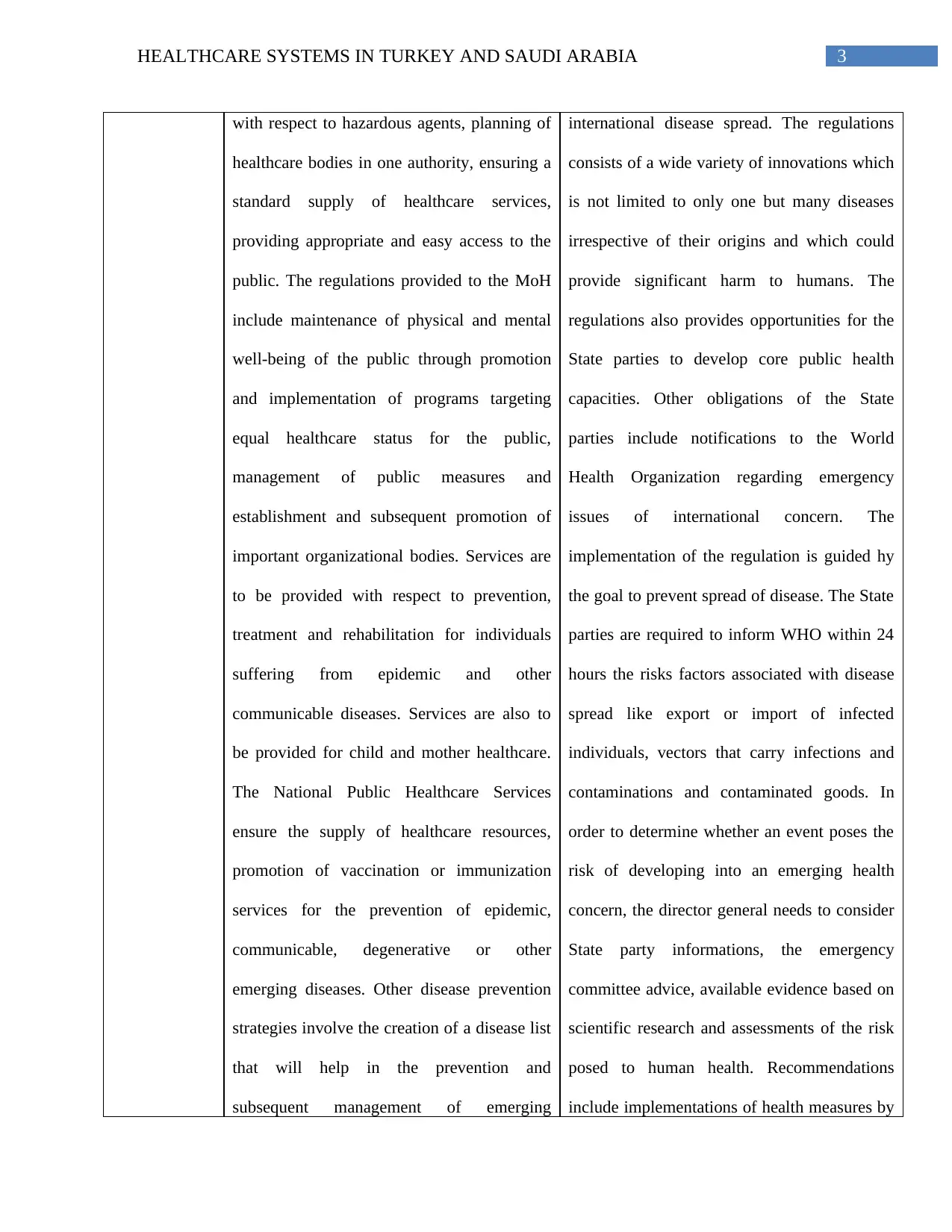
3HEALTHCARE SYSTEMS IN TURKEY AND SAUDI ARABIA
with respect to hazardous agents, planning of
healthcare bodies in one authority, ensuring a
standard supply of healthcare services,
providing appropriate and easy access to the
public. The regulations provided to the MoH
include maintenance of physical and mental
well-being of the public through promotion
and implementation of programs targeting
equal healthcare status for the public,
management of public measures and
establishment and subsequent promotion of
important organizational bodies. Services are
to be provided with respect to prevention,
treatment and rehabilitation for individuals
suffering from epidemic and other
communicable diseases. Services are also to
be provided for child and mother healthcare.
The National Public Healthcare Services
ensure the supply of healthcare resources,
promotion of vaccination or immunization
services for the prevention of epidemic,
communicable, degenerative or other
emerging diseases. Other disease prevention
strategies involve the creation of a disease list
that will help in the prevention and
subsequent management of emerging
international disease spread. The regulations
consists of a wide variety of innovations which
is not limited to only one but many diseases
irrespective of their origins and which could
provide significant harm to humans. The
regulations also provides opportunities for the
State parties to develop core public health
capacities. Other obligations of the State
parties include notifications to the World
Health Organization regarding emergency
issues of international concern. The
implementation of the regulation is guided hy
the goal to prevent spread of disease. The State
parties are required to inform WHO within 24
hours the risks factors associated with disease
spread like export or import of infected
individuals, vectors that carry infections and
contaminations and contaminated goods. In
order to determine whether an event poses the
risk of developing into an emerging health
concern, the director general needs to consider
State party informations, the emergency
committee advice, available evidence based on
scientific research and assessments of the risk
posed to human health. Recommendations
include implementations of health measures by
with respect to hazardous agents, planning of
healthcare bodies in one authority, ensuring a
standard supply of healthcare services,
providing appropriate and easy access to the
public. The regulations provided to the MoH
include maintenance of physical and mental
well-being of the public through promotion
and implementation of programs targeting
equal healthcare status for the public,
management of public measures and
establishment and subsequent promotion of
important organizational bodies. Services are
to be provided with respect to prevention,
treatment and rehabilitation for individuals
suffering from epidemic and other
communicable diseases. Services are also to
be provided for child and mother healthcare.
The National Public Healthcare Services
ensure the supply of healthcare resources,
promotion of vaccination or immunization
services for the prevention of epidemic,
communicable, degenerative or other
emerging diseases. Other disease prevention
strategies involve the creation of a disease list
that will help in the prevention and
subsequent management of emerging
international disease spread. The regulations
consists of a wide variety of innovations which
is not limited to only one but many diseases
irrespective of their origins and which could
provide significant harm to humans. The
regulations also provides opportunities for the
State parties to develop core public health
capacities. Other obligations of the State
parties include notifications to the World
Health Organization regarding emergency
issues of international concern. The
implementation of the regulation is guided hy
the goal to prevent spread of disease. The State
parties are required to inform WHO within 24
hours the risks factors associated with disease
spread like export or import of infected
individuals, vectors that carry infections and
contaminations and contaminated goods. In
order to determine whether an event poses the
risk of developing into an emerging health
concern, the director general needs to consider
State party informations, the emergency
committee advice, available evidence based on
scientific research and assessments of the risk
posed to human health. Recommendations
include implementations of health measures by
Paraphrase This Document
Need a fresh take? Get an instant paraphrase of this document with our AI Paraphraser
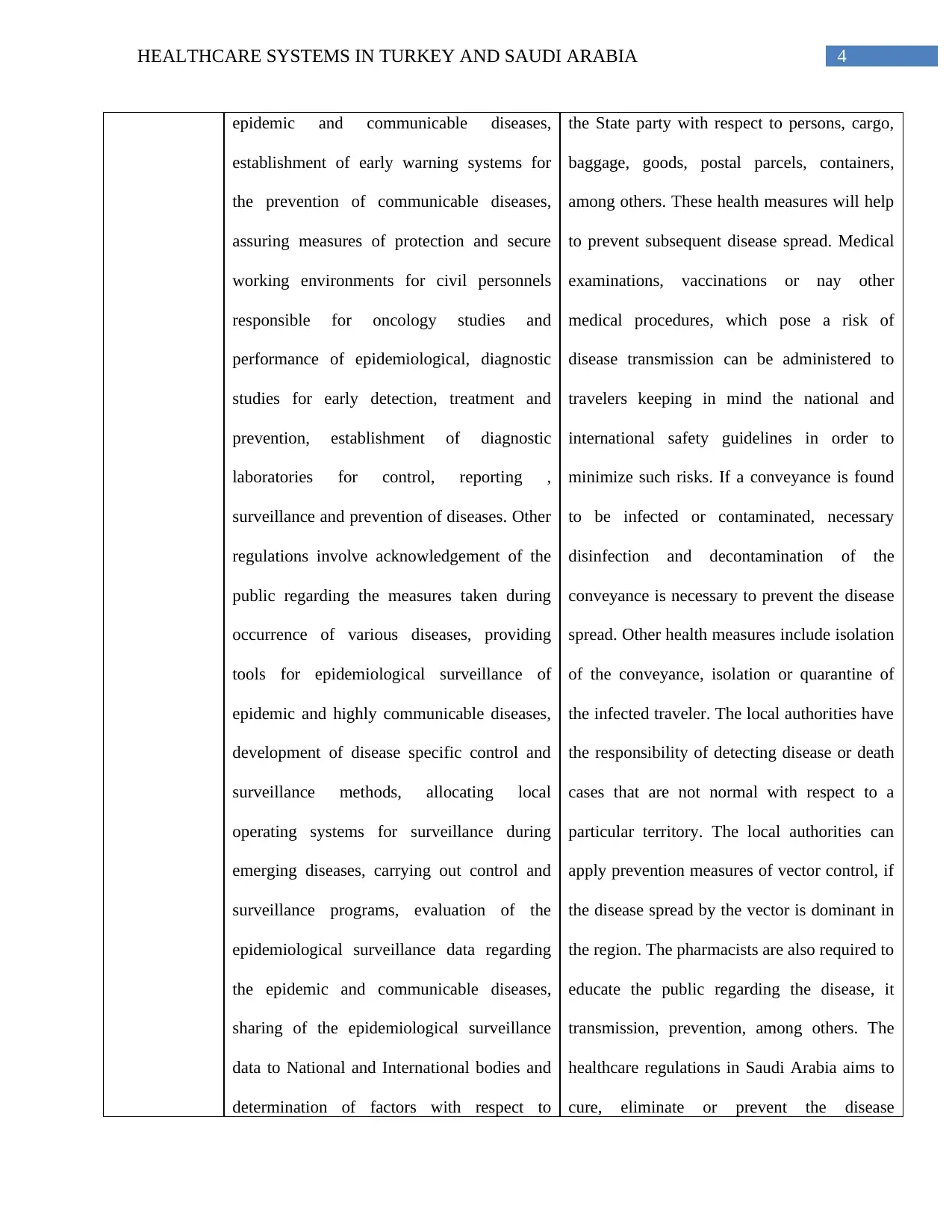
4HEALTHCARE SYSTEMS IN TURKEY AND SAUDI ARABIA
epidemic and communicable diseases,
establishment of early warning systems for
the prevention of communicable diseases,
assuring measures of protection and secure
working environments for civil personnels
responsible for oncology studies and
performance of epidemiological, diagnostic
studies for early detection, treatment and
prevention, establishment of diagnostic
laboratories for control, reporting ,
surveillance and prevention of diseases. Other
regulations involve acknowledgement of the
public regarding the measures taken during
occurrence of various diseases, providing
tools for epidemiological surveillance of
epidemic and highly communicable diseases,
development of disease specific control and
surveillance methods, allocating local
operating systems for surveillance during
emerging diseases, carrying out control and
surveillance programs, evaluation of the
epidemiological surveillance data regarding
the epidemic and communicable diseases,
sharing of the epidemiological surveillance
data to National and International bodies and
determination of factors with respect to
the State party with respect to persons, cargo,
baggage, goods, postal parcels, containers,
among others. These health measures will help
to prevent subsequent disease spread. Medical
examinations, vaccinations or nay other
medical procedures, which pose a risk of
disease transmission can be administered to
travelers keeping in mind the national and
international safety guidelines in order to
minimize such risks. If a conveyance is found
to be infected or contaminated, necessary
disinfection and decontamination of the
conveyance is necessary to prevent the disease
spread. Other health measures include isolation
of the conveyance, isolation or quarantine of
the infected traveler. The local authorities have
the responsibility of detecting disease or death
cases that are not normal with respect to a
particular territory. The local authorities can
apply prevention measures of vector control, if
the disease spread by the vector is dominant in
the region. The pharmacists are also required to
educate the public regarding the disease, it
transmission, prevention, among others. The
healthcare regulations in Saudi Arabia aims to
cure, eliminate or prevent the disease
epidemic and communicable diseases,
establishment of early warning systems for
the prevention of communicable diseases,
assuring measures of protection and secure
working environments for civil personnels
responsible for oncology studies and
performance of epidemiological, diagnostic
studies for early detection, treatment and
prevention, establishment of diagnostic
laboratories for control, reporting ,
surveillance and prevention of diseases. Other
regulations involve acknowledgement of the
public regarding the measures taken during
occurrence of various diseases, providing
tools for epidemiological surveillance of
epidemic and highly communicable diseases,
development of disease specific control and
surveillance methods, allocating local
operating systems for surveillance during
emerging diseases, carrying out control and
surveillance programs, evaluation of the
epidemiological surveillance data regarding
the epidemic and communicable diseases,
sharing of the epidemiological surveillance
data to National and International bodies and
determination of factors with respect to
the State party with respect to persons, cargo,
baggage, goods, postal parcels, containers,
among others. These health measures will help
to prevent subsequent disease spread. Medical
examinations, vaccinations or nay other
medical procedures, which pose a risk of
disease transmission can be administered to
travelers keeping in mind the national and
international safety guidelines in order to
minimize such risks. If a conveyance is found
to be infected or contaminated, necessary
disinfection and decontamination of the
conveyance is necessary to prevent the disease
spread. Other health measures include isolation
of the conveyance, isolation or quarantine of
the infected traveler. The local authorities have
the responsibility of detecting disease or death
cases that are not normal with respect to a
particular territory. The local authorities can
apply prevention measures of vector control, if
the disease spread by the vector is dominant in
the region. The pharmacists are also required to
educate the public regarding the disease, it
transmission, prevention, among others. The
healthcare regulations in Saudi Arabia aims to
cure, eliminate or prevent the disease
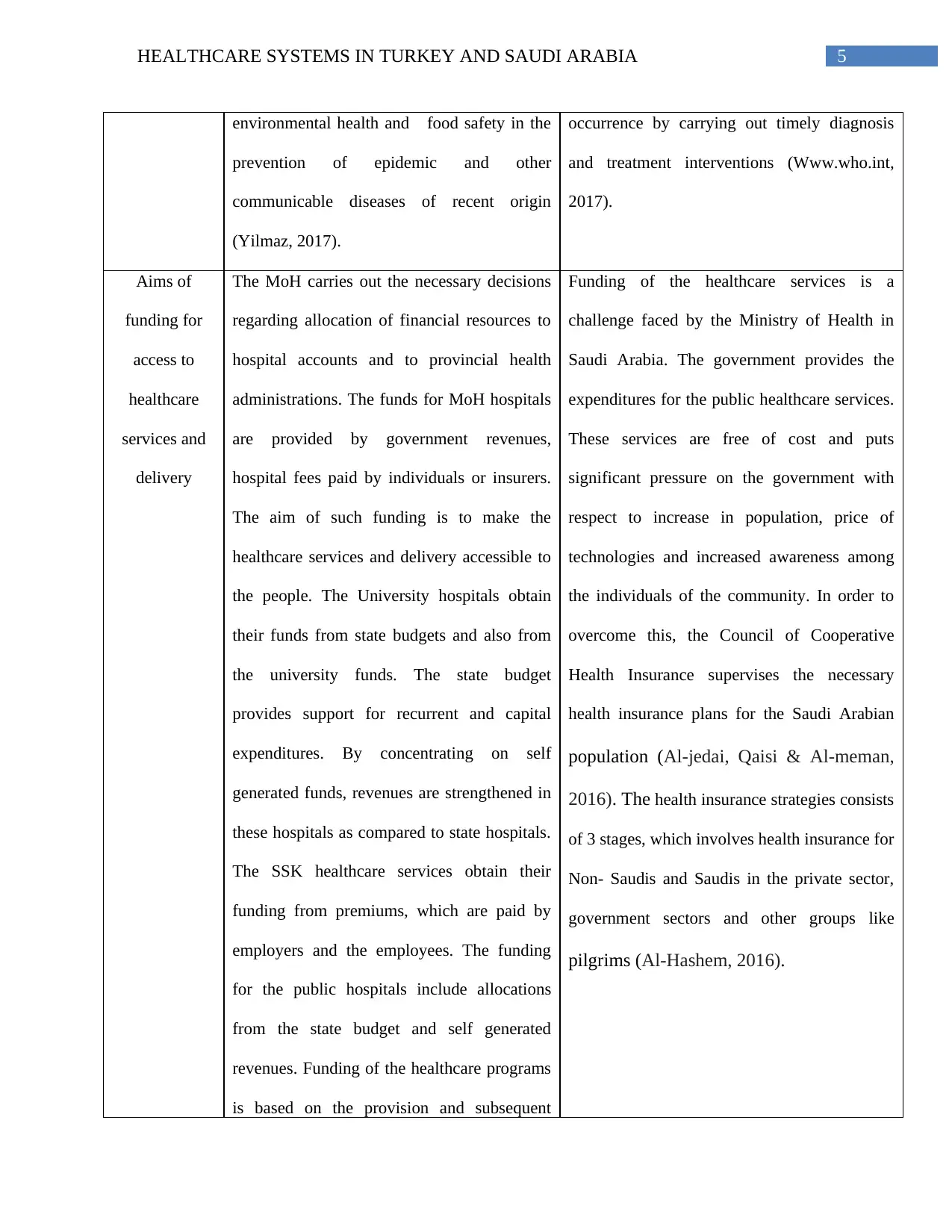
5HEALTHCARE SYSTEMS IN TURKEY AND SAUDI ARABIA
environmental health and food safety in the
prevention of epidemic and other
communicable diseases of recent origin
(Yilmaz, 2017).
occurrence by carrying out timely diagnosis
and treatment interventions (Www.who.int,
2017).
Aims of
funding for
access to
healthcare
services and
delivery
The MoH carries out the necessary decisions
regarding allocation of financial resources to
hospital accounts and to provincial health
administrations. The funds for MoH hospitals
are provided by government revenues,
hospital fees paid by individuals or insurers.
The aim of such funding is to make the
healthcare services and delivery accessible to
the people. The University hospitals obtain
their funds from state budgets and also from
the university funds. The state budget
provides support for recurrent and capital
expenditures. By concentrating on self
generated funds, revenues are strengthened in
these hospitals as compared to state hospitals.
The SSK healthcare services obtain their
funding from premiums, which are paid by
employers and the employees. The funding
for the public hospitals include allocations
from the state budget and self generated
revenues. Funding of the healthcare programs
is based on the provision and subsequent
Funding of the healthcare services is a
challenge faced by the Ministry of Health in
Saudi Arabia. The government provides the
expenditures for the public healthcare services.
These services are free of cost and puts
significant pressure on the government with
respect to increase in population, price of
technologies and increased awareness among
the individuals of the community. In order to
overcome this, the Council of Cooperative
Health Insurance supervises the necessary
health insurance plans for the Saudi Arabian
population (Al-jedai, Qaisi & Al-meman,
2016). The health insurance strategies consists
of 3 stages, which involves health insurance for
Non- Saudis and Saudis in the private sector,
government sectors and other groups like
pilgrims (Al-Hashem, 2016).
environmental health and food safety in the
prevention of epidemic and other
communicable diseases of recent origin
(Yilmaz, 2017).
occurrence by carrying out timely diagnosis
and treatment interventions (Www.who.int,
2017).
Aims of
funding for
access to
healthcare
services and
delivery
The MoH carries out the necessary decisions
regarding allocation of financial resources to
hospital accounts and to provincial health
administrations. The funds for MoH hospitals
are provided by government revenues,
hospital fees paid by individuals or insurers.
The aim of such funding is to make the
healthcare services and delivery accessible to
the people. The University hospitals obtain
their funds from state budgets and also from
the university funds. The state budget
provides support for recurrent and capital
expenditures. By concentrating on self
generated funds, revenues are strengthened in
these hospitals as compared to state hospitals.
The SSK healthcare services obtain their
funding from premiums, which are paid by
employers and the employees. The funding
for the public hospitals include allocations
from the state budget and self generated
revenues. Funding of the healthcare programs
is based on the provision and subsequent
Funding of the healthcare services is a
challenge faced by the Ministry of Health in
Saudi Arabia. The government provides the
expenditures for the public healthcare services.
These services are free of cost and puts
significant pressure on the government with
respect to increase in population, price of
technologies and increased awareness among
the individuals of the community. In order to
overcome this, the Council of Cooperative
Health Insurance supervises the necessary
health insurance plans for the Saudi Arabian
population (Al-jedai, Qaisi & Al-meman,
2016). The health insurance strategies consists
of 3 stages, which involves health insurance for
Non- Saudis and Saudis in the private sector,
government sectors and other groups like
pilgrims (Al-Hashem, 2016).
⊘ This is a preview!⊘
Do you want full access?
Subscribe today to unlock all pages.

Trusted by 1+ million students worldwide
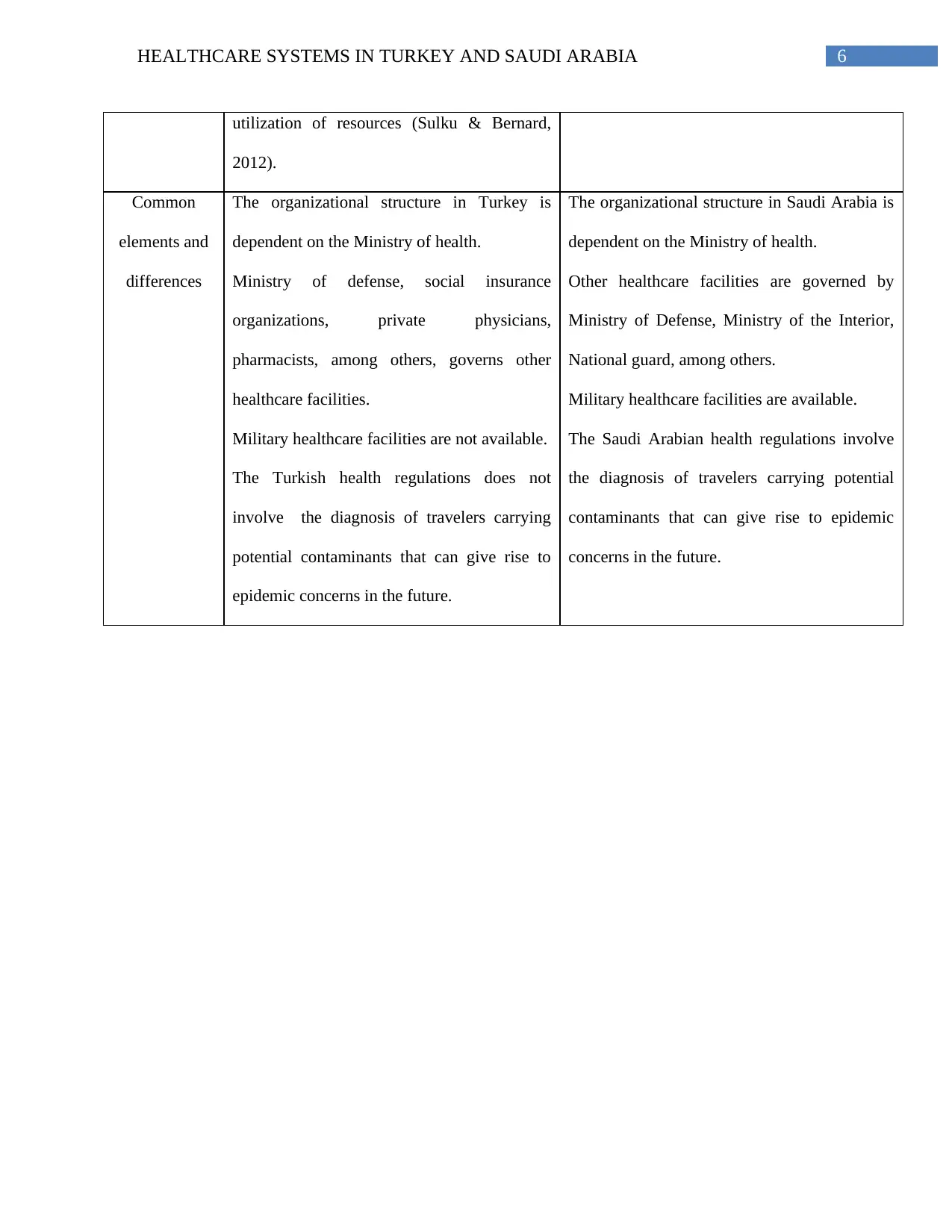
6HEALTHCARE SYSTEMS IN TURKEY AND SAUDI ARABIA
utilization of resources (Sulku & Bernard,
2012).
Common
elements and
differences
The organizational structure in Turkey is
dependent on the Ministry of health.
Ministry of defense, social insurance
organizations, private physicians,
pharmacists, among others, governs other
healthcare facilities.
Military healthcare facilities are not available.
The Turkish health regulations does not
involve the diagnosis of travelers carrying
potential contaminants that can give rise to
epidemic concerns in the future.
The organizational structure in Saudi Arabia is
dependent on the Ministry of health.
Other healthcare facilities are governed by
Ministry of Defense, Ministry of the Interior,
National guard, among others.
Military healthcare facilities are available.
The Saudi Arabian health regulations involve
the diagnosis of travelers carrying potential
contaminants that can give rise to epidemic
concerns in the future.
utilization of resources (Sulku & Bernard,
2012).
Common
elements and
differences
The organizational structure in Turkey is
dependent on the Ministry of health.
Ministry of defense, social insurance
organizations, private physicians,
pharmacists, among others, governs other
healthcare facilities.
Military healthcare facilities are not available.
The Turkish health regulations does not
involve the diagnosis of travelers carrying
potential contaminants that can give rise to
epidemic concerns in the future.
The organizational structure in Saudi Arabia is
dependent on the Ministry of health.
Other healthcare facilities are governed by
Ministry of Defense, Ministry of the Interior,
National guard, among others.
Military healthcare facilities are available.
The Saudi Arabian health regulations involve
the diagnosis of travelers carrying potential
contaminants that can give rise to epidemic
concerns in the future.
1 out of 7
Related Documents
Your All-in-One AI-Powered Toolkit for Academic Success.
+13062052269
info@desklib.com
Available 24*7 on WhatsApp / Email
![[object Object]](/_next/static/media/star-bottom.7253800d.svg)
Unlock your academic potential
Copyright © 2020–2026 A2Z Services. All Rights Reserved. Developed and managed by ZUCOL.





